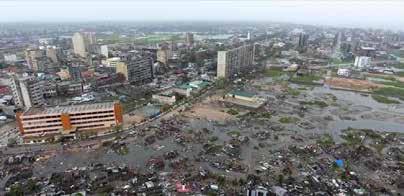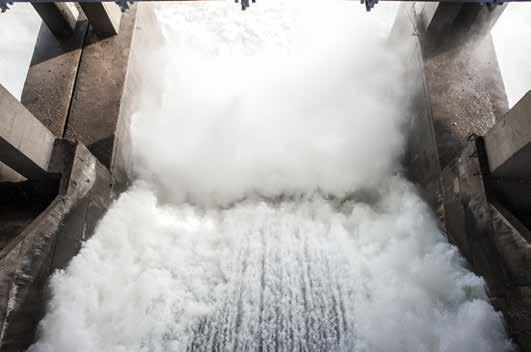
5 minute read
Africa round-up
Water and sanitation in Africa
BOTSWANA
Advertisement
Raw water levy on the cards
Botswana’s Department of Water and Sanitation is reportedly developing an informative raw water abstraction and pricing strategy for all forms of raw water.
The aim of the raw water levy is to sustain water resources management funding while acting as a demand and management tool and managing issues of equitable and reasonable utilisation.
While some are sceptical of the strategy, others are supportive but have cautioned that pricing be based on use rather than standardised.
A study on raw water abstraction and pricing is already under way, conducted by Newtech Consulting Group and ACE-GIBB.
KENYA
Solar-powered desalination
Climate Fund Managers (CFM) has agreed to co-finance and -develop a portfolio of solar-powered desalination installations, turning brackish groundwater into drinking water in Kenya.
The financing will initially assist with a piloting phase for these installations and later the full roll-out of up to 200 units in Kitui County, which will reach up to 400 000 Kenyan citizens.
In Kitui, many wells that are used to provide drinking water contain salts and fluoride, rendering the water unsafe for direct consumption. The project aims to remove these substances from the abstracted groundwater and alleviate the lack of access to high-quality drinking water.
“We are very pleased with the initiative that will bring very clean drinking water to the rural population in Kitui County that needs it most. It is the most exciting project I have been part of in all my career,” says Emmanuel Kisangau, Minister of Water, Kitui County. The installations will consist of a mobile container housing reverse osmosis water treatment, solar panels and a ‘water ATM’, which allows citizens to purchase high-quality

Photo credit: Solar Water Solutions
MOZAMBIQUE
Recovery from 2019 cyclones
The European Investment Bank (EIB) has provided a €100 million (R1.81 billion) loan, blended with a €10 million (R181 million) grant, to improve public health and climate resilience, and reduce the spread of Covid-19 in Mozambique as the country still recovers from the 2019 cyclones.
The loan will allow the Cabinet for Post-Idai and Kenneth Reconstruction, responsible for managing and monitoring the operation, to build resilience for future adversity through improved water supply, wastewater and drainage infrastructure in affected cities.
Thomas Östros, vice-president, EIB, says: “Security of supply of clean water and ensuring that water infrastructure is protected amid the current climate emergency are priorities for the EIB. As the largest international lender to the water sector worldwide, the EIB is glad to finance and provide its expertise to this project in Mozambique, which will make local water infrastructure safer and more efficient. EU-backed investment will improve public health, [which is] even more important during the global Covid-19 pandemic.”
This investment will be used to ‘Build Back Better’ the infrastructure that was damaged by the cyclones and subsequent floods, improving public health and making cities more resilient to climate-related risks and extreme events. New wastewater infrastructure will also help to avoid untreated slop flowing into rivers, tying the project into the worldwide Clean Ocean Initiative.

water using their mobile phones. Each installation will run only on renewable energy, without the use of expensive battery storage or electricity from the grid.
The primary development and technology company behind the initiative is Solar Water Solutions, a Finnish company founded in 2015 and specialising in delivering water purification solutions for sustainable water use in remote locations.
Given the comparatively low water supply coverage across Kenya, coupled with the often-poor water quality when supply is available, the benefits of the desalination installations are expected to offer significant impact potential in areas that are currently prone to water scarcity.
Upon full deployment, it is estimated that the installations will have the capacity to desalinate over 1 500 m3 of brackish water per day and produce over 1 GWh per year of self-supporting clean energy to power the systems.
NIGERIA
New water bill controversies
Minister of Water Resources Suleiman Adamu has allayed controversies over the proposed National Water Resources Bill, arguing that the bill was the product of extensive national consultations. He believes the new legislation will promote the equitable development and management of groundwater resources.
Speaking at the 27th Regular Meeting of the National Council on Water Resources in Abuja, Adamu stated, “The debate over the bill comes against the backdrop of a situation where the country’s health is being undermined by unsafe drinking water, its agriculture battling with under-production, threatening our national food security, while the sources of water supply have been subjected to much abuse with the attendant threat on the environment.
“The bill is, therefore, the manifestation of the government’s TANZANIA
Malagarasi Hydropower Project get $120 million loan
The African Development Bank (AfDB) has approved a US$120 million (R1.8 billion) loan to fund the construction of a 50 MW hydropower plant in Western Tanzania that will provide reliable, renewable energy to households, schools, clinics and small and medium-sized enterprises in the Kigoma Region.
An additional $20 million (R300 million) will be contributed by the Africa Growing Together Fund – a co-financing fund with resources from the government of the People’s Republic of China. The government of Tanzania will provide the remaining $4.14 million (R62 million) to meet the project’s overall project estimated cost of $144.14 million (R2.16 billion).
The Malagarasi Hydropower Project has several components, including: a run-of-river hydropower plant facility; a 54 km, 132 kV transmission line that will connect to Tanzania’s national grid; a distribution network expansion operation, which includes rural electrification and last-mile connections; project management and desire to ensure that the citizens derive maximum benefits from the country’s water resource endowments and potentials.”
Once signed into law, the bill will provide a regulatory framework to ensure water resources are protected, used, developed, conserved, managed and controlled in ways that: contract administration support; and compensation and resettlement of affected persons.
The hydropower plant’s expected average annual output of 181 GWh will meet the electricity needs of as many as 133 649 Kigoma households, bringing the region’s electrification rate more closely in line with the rest of the country. • consider citizens’ right of access to clean water and sanitation • meet the basic needs of current and future generations • adapt hydrological boundaries • ustainably protect the water environment and aquatic ecosystems

• recognise the polluter-pays principle. The project is expected to create about 700 jobs during construction, cut the region’s electricity generation costs to approximately $0.04/kWh (R0.60/kWh) from the current $0.33/kWh (R5.00/kWh), and also reduce reliance on greenhousegas-emitting fossil fuels. The cost of doing business will also fall because industry will no longer need to maintain costly backup generators.











